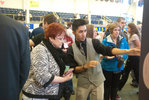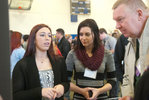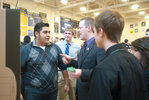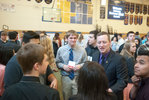






When more than 400 juniors from Centralia and W.F. West high schools started the annual Washington Business Week program on Monday, few knew the first thing about running a business.
“At first you have absolutely no idea what’s going on,” W.F. West student Andrew Painter said Thursday.
Many students were nervous. Some didn’t want to be there at all. Almost all were placed in teams with people they’d never met, some from another high school.
Just a few days later, on Thursday, students were confidently weaving through the packed Centralia College gym seeking out investors for their newly-formed companies.
“This has been a really good year,” said judge Tom Alderson as he walked through the business week trade show Thursday, where students sought out new “investors” for their products.
All 401 students who participated in business week started Monday by being assigned to a team, which would become their business. Each team had a volunteer company adviser — a business person from the area — who helped the team through the week.
“They’re parachuted into a business. They actually operate a business from the first morning,” said Tom Nixon, a member of the Washington Business Week board. “There’s a lot of confusion … From the first quarter to the sixth quarter, the learning curve is just straight up.”
Over the ensuing days, the students take their businesses through six quarters of growth. Each student has a role to play, led by the CEO. Each business primarily makes digital media players, but is tasked with creating a new product for their company during the week.
The program pushes students to be independent and creative on a short deadline.
“There’s a lot of academic intensity in this program,” said Herman Calzadillas, director of programs at Washington Business Week,
The program typically lasts five days, but students had a half day Friday to start off their Christmas break. On Thursday, their last day, teams were evaluated by three groups of judges acting as stockholders. During three stockholder meetings, students had to explain their company’s growth over the week.
Later Thursday morning, students set up booths at a mock trade show where they worked to attract investors to their company’s products. Teams were competing to get the most investments from judges.
“We’re going to make you instant billionaires. We’re going to give you Business Week Bucks,” Calzadillas told judges Thursday morning.
Nixon warned judges not to get too wrapped up in the competition. He said students have a broad, but not deep knowledge of business at the end of the week.
“We’re looking at the learning process,” he said. “Their knowledge is remarkable, but it’s not like they’ve been through an MBA program.”
Amanda Hubbert said participating in Washington Business Week inspired her to pursue a career in business. Now she volunteers with Business Week each year as a company adviser.
“I enjoyed the program so much I studied business in college,” she said. “(It’s) just such a good program in the community.”
Company adviser Allyn Roe said he’s volunteered at Business Week for about five years.
“It’s just amazing to watch their progress,” he said.
Not all progress is reflected in the students’ fledgeling knowledge of running a business.
“Some of the growth is really small,” Hubbert said. “We talked about how to shake an adult’s hand and look them in the eye.”
Students also learned that businesses have room for people of diverse skillsets. Hubbert said one girl in her group didn’t want to participate at first because she wants to be an artist.
Hubbert appointed her as director of marketing for the team, and said she spent the week happily designing advertisements and other visual materials for the group.
Some students said they weren’t considering business careers before, but had changed their minds.
“Now I kind of got a glance at it, and now I’m looking forward to it,” said Omar Flores.
While not all students now want to pursue business, several said they got a look at a subject they rarely get to study in traditional high school classes.
“I think it’s a lot easier than I expected, but it’s a lot of hard work and you have to be really dedicated,” said Breanna Brown.